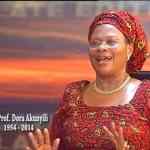When we mention heroes in Nigerian history, very little is said of the women. However, there are a lot of stories to tell about Historic Nigerian women. Below is a list of both deceased and living Nigerian heroines.
1. Funmilayo Ransome-Kuti
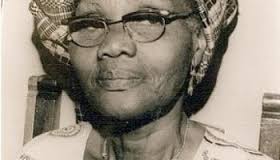
In the year 1965, Funmilayo Ransome-Kuti received the national honor of membership in the Order of Nigeria. She was also bestowed the honorary doctorate of laws by the University of Ibadan in the year 1968. Throughout her career, Funmilayo was known as an educator and activist. She joined forces with Elizabeth Adekogbe in providing leadership for women’s rights in the 1950s. She founded an organization for women in Abeokuta, that had more than 20,000 women as members; including both literate and illiterate women.
In the year 1949, she led a protest against the Alake of Egbaland, a native authority. She then made a presentation of documents alleging abuse of power by the Alake; whom the then government, granted the right to collect the taxes. She also led a movement that oversaw the successful abolishing of separate tax rates for women. In the year 1953, she founded the Federation of Nigerian Women Societies; an association that allied with the Women’s International Democratic Federation. Funmilayo Ransome Kuti campaigned for, and ensured that women’s votes counted during elections.
Before Nigeria’s independence of 1960, Funmilayo founded the Commoners Peoples Party in an attempt to challenge the ruling NCNC; this action ultimately denied the NCNC victory in her area.
2. Queen Moremi
Moremi Ajasoro, Princess of the Yoruba, was a figure of high significance in the history of the Yoruba peoples. She was a very brave and beautiful woman who, to deal with the problem facing her people; offered anything she had to give in sacrifice to the Spirit of the river Esimirin; so that she could discover the strength of her nation’s enemies.
Moremi decided upon a strategy. She went to the nearby river Esinmirin and vowed to the deity; that she would make the greatest sacrifice possible if they allowed her to discover the strength of her nation’s enemies. Then, she went to a place that was raided a lot; and when the raiders did come she allowed herself to be captured. Being very beautiful she was taken as booty to the Igbo King. She was very confident and skillful; and soon won the trust and affection of the King and people in Igbo land. Moremi became familiar with their customs and tactics of warfare. She found that the Igbo, in preparation for battle; would cover themselves from head to toe with Ekan grass and bamboo fibers. She realized that if someone could pass amongst the Igbo warriors with a torch that they could be defeated.
Feeling that she had adequate knowledge, she escaped, to the great surprise of her Igbo captors. She returned to her first husband, King Oramiyan of Ife (and later Oyo); who immediately had her re-instated as his Princess Consort. Knowing the warfare secrets of the Igbo; the people of Ife were forever freed from the terrors of these previously invincible warriors.
3. Queen Amina Bakwa
Amina was the daughter of Bakwa of Turunku. When Bakwa died in 1566, the crown of Zazzua passed to Amina’s younger brother, Karama. Amina chose to hone her military skills from the warriors of the Zazzau military. As a result, she emerged as the leader of the Zazzua cavalry. Many accolades, great wealth, and increased power resulted from her numerous military achievements. She eventually became king after her brother died.
Amina led her first military charge a few months after assuming power. For the rest of her 34-year reign, she continued to fight and expand her kingdom to the greatest in history. The objective of initiating so many battles was to make neighbouring rulers her vassal and permit her traders’ safe passage. In this way, she boosted her kingdom’s wealth and power with gold, slaves, and new crops. Because her people were talented metal workers.
Amina introduced metal armor, including iron helmets and chain mail, to her army; to her credit, she fortified each of her military camps with an earthen wall. Later, towns and villages sprung up within these protective barriers. The walls became known as Amina’s Walls and many of them remain in existence to this day. Her legendary escapades made her the model for the television series Xena Warrior Princess. Today, her memory represents the spirit and strength of womanhood.
4. Florence Nwanzuruahu Nkiru Nwapa
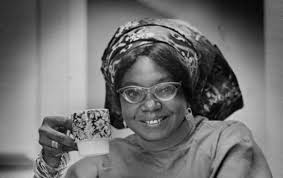
She was a Nigerian author best known as Flora Nwapa. Her novel Efuru (1966) is among the first English-language novels by a woman from Africa. Born in Oguta, was the forerunner to a generation of African women writers.
While never considering herself a feminist, she is best known for recreating life and traditions from a woman’s viewpoint. In 1966 her book Efuru became Africa’s first internationally published female novel in the English language (Heinemann Educational Books). She has been called the mother of modern African literature. Later she went on to become the first African woman publisher of novels when she founded Tata Press.
She also is known for her governmental work in reconstruction after the Biafran War. In particular, she worked with orphans and refugees that were displaced during the war. Further, she worked as a publisher of African literature and promoted women in African society. Flora Nwapa died on 16 October 1993 in Enugu, Nigeria
5. Nana Asmau
Nana Asma’u was a princess, poet, teacher, and daughter of the founder of the Sokoto Caliphate, Usman dan Fodio. Of all these, Nana is revered as an advocate for the education of Muslim women. She was devoted to the education of Muslim women. She published her first long poem, “The way of the Pious” in 1820; and it was followed by 60 more, which is studied in international academic institutions to date.
As an Educator
Nana became the first pioneer of women’s education in what later became Northern Nigeria. She trained a large network of women as educators and placed a strong emphasis on women leaders; and, the rights of women within the community ideals of the Sunnah and Islamic law. She was an accomplished author and respected scholar in communication with scholars throughout the sub-Saharan African Muslim world.
Having witnessed many of the Fulani War, she wrote about her experiences in a prose narrative, Wakar Gewaye, “The Journey”; and left a large body of poetry, historical narratives, which also include elegies, laments, and admonitions; which became tools for teaching the founding principles of the Caliphate.
6. Barmani Choge
She was one of the best female Hausa singers from Northern Nigeria. Barmani Choge popularized the mature Hausa women genre of music called Amada; which is centered around five upturned calabashes floating on water and played with the hands by elderly women.
Her Impact
Without fear of tradition or religion, her songs talked about serious social issues; like women’s education and the importance of small-scale trading by women; to vulgar topics like co-wives as idle snobs, voluptuous women’s backsides, etc. The core message of her song is that women should get up and shine in this male-dominated world.
Barmani Choge’s performances appeal to women in high society; due to her courage and how she takes on issues that other conventional women musicians avoid. Her music did not only make women dance, it also made them think about their status in society.
7. Alimotu Pelewura
Alimotu Pelewura was the woman who led the Lagos Market Women’s Association in its struggles for women’s right; to vote and against taxation during the colonial era. Even though Pelewura was an uneducated fish seller, she greatly influenced decisions in favor of her fellow market women. During the colonial era, she paid clerks and hired lawyers to represent them in their struggles. She wielded so much power that she became a source of concern to the British officials.
Her Influence
As a result of her influence, market women exercised a great deal of control over the markets; decided on locations, fixed prices, provided for upkeep, and gave loans to members. Pelewura, together with other market women strongly protested the price control plan; popularly known as the Pullen scheme named after its director, Captain A.P. Pullen.
She also worked with several nationalist parties as well as the Nigerian National Democratic Party; and, in 1938, she served in the Nigerian Union of Young Democrats. In 1945, during a major general strike, market women in support of the striking worker reduced the prices of goods. In 1947, she was given the title of ‘Erelu,’ for representing the interests of women.
8. Buchi Emecheta
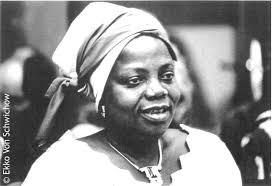
Florence Onyebuchi “Buchi” Emecheta was born in 1944, a time when there was a gender bias towards women. While she stayed at home, her younger brother was allowed to go to school. Buchi’s dream of becoming a writer came alive through an older aunt who told her stories during dinner.
The opportunity came, when a year after her father died; she got a full scholarship to attend the Methodist Girls School. Through some of her books, Buchi revealed that her marriage was a violent one as her husband was abusive.
Her first book, “The Bride Price” was burnt by her husband; and she had to write another one in 1976. Buchi left her husband at the age of 22. While working to care for her 5 children, she earned a BSc degree in Sociology at the University of London.
Her writing explored topics such as child marriage, single motherhood, and women abuse. As a celebrated and successful author, she traveled far and wide; visiting many American universities. In 1982, she lectured at Yale University, and the University of London; as well as holding a fellowship at the University of London in 1986.
Her Achievements
Some of her books include; The Joys of Motherhood (1979), Second-Class Citizen (1974), The Bride Price (1976), and The Slave Girl (1977). She published over 20 books, including children’s fiction. She also wrote many plays for the BBC and several articles published in journals all over the world.
Buchi Emecheta won several awards like the Jock Campbell Award from the New Statesman in 1979. She was Granta magazine’s 1983 list of “Best of the Young British Novelists”. In 2005, she was made an Order of the British Empire. Buchi wrote about feminist struggle but didn’t describe herself as one. Her work has inspired and paved way for many Nigerian women writers and author
9. Agbani Darego
Agbani Darego born Agbani Asenite Darego is a Nigerian model and beauty queen, best known as the first native African to win Miss World.In 2001, Darego was crowned the Most Beautiful Girl in Nigeria. Contrary to popular belief, Darego did not replace Valerie Peterside after the latter was dethroned; as she had won Miss Nigeria. A few months later she was a contestant at Miss Universe; and became the first Nigerian to place among the top 10 semi-finalists; finishing seventh overall. She was the only one to wear a maillot as opposed to a bikini during the swimsuit competition.
In November that year, she became the first native African to claim the Miss World title. Although past winners such as Penelope Coelen and Anneline Kriel are South African, they are of European descent; and Antigone Costanda, who represented Egypt in 1954 is of Greek heritage. Darego’s victory was widely welcomed in her home country; and her one-year tenure included goodwill trips and appearances on behalf of the pageant; and national honor of MFR.
Darego has judged numerous pageants, and fashion and modeling competitions; including Miss World 2014, Miss England 2002, Mr. Scotland 2002, and Elite Model Look Nigeria 2012 and 2014.
10. Hon Abike Dabiri Arewa
Dabiri-Erewa fondly called “Mother Teresa of the tube” prides herself in her outstanding career as a broadcaster. She spent 15 years of her noted and meritious service at the Nigerian Television Authority (NTA). While in NTA she gained a strong understanding of the industry because of her dedication, inquisitiveness, and professionalism. She anchored the weekly NTA Newsline program to the delight of millions of Nigerians, irrespective of their tribe or religion. Dabiri-Erewa wormed her way into the hearts of many with her brave efforts of using television as an effective tool to draw attention to the millions of Nigerians suffering from the pains of poverty and injustice.
Her commitment and passionate dedication to duty while working on several heart-touching Newsline stories; stood her out and drew her to many. Her display of courage while investigating the story of little Mary; the miracle baby for eight years, remains indelible in the minds of many Nigerians.
Her Political Life
A firm believer in the importance of service to humanity, Dabiri-Erewa voluntarily retired from the services of the NTA to contest as a member of the House of Representatives and swept the poll with a landslide victory in 2003. Ever since then, she has distinguished herself by working tirelessly. Dabiri-Erewa, 52, is a third-term member of the House of Representatives at the National Assembly. This confers on her, the status of the most prominent female politician in Lagos State; and, one of the most prominent politicians in Nigeria today.
She was the Chairman, House Committee on Media in Federal House of Representative from 2003 to 2007; Honourable Member, Federal House of Representative from 2003 to 2007; Board Member, Lagos State Broadcasting Corporation Vision 2010; Honourable Member, Federal House of Representative from the year 2007 to 2011. She is currently An aide of Nigeria’s president and CEO, Nigerian Diasporan Commission.
11. Prof. Dora Akuyili
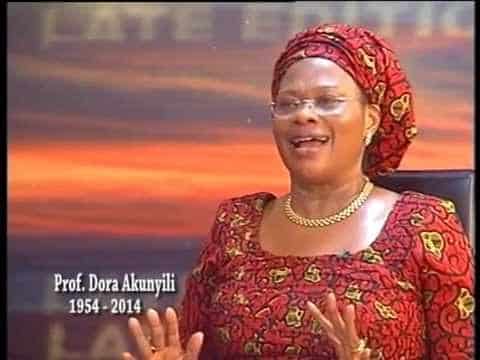
All through her career from school days up till the professional level, there have been traces of exceptional leadership characters; many of which were seen by a larger population of Nigerians when she became DG of NAFDAC in April 2001. For Dora Akuyili, everything she found herself doing was more than the ROLE, but about the GOAL to achieve.
She was Nigeria’s Honourable Minister of Information and Communications until December 16, 2010; when she resigned to further actualize her ambition of becoming the Senator representing Anambra Central in the National Assembly. She’s an internationally renowned Pharmacist, Pharmacologist, Erudite Scholar, Seasoned Administrator, and a visionary leader. She has gained international recognition and won hundreds of awards for her work in pharmacology, public health, and human rights.
Akunyili prepared herself for the administrative position at NAFDAC; by her four years stretch as Zonal Secretary of Petroleum Special Trust Fund (PTF). Coordinating all projects in the five south-eastern states of Nigeria (Abia, Anambra, Ebonyi, Enugu, and Imo States). The late DG of NAFDAC did everything within her capacity for the good of Nigeria without strings attached.
Her Political Life
Before she became the Minister of Information and Communication, the world had a very negative perception of Nigeria. When she became Minister in 2008, she lamented: “…At airports and other public places across the globe; whenever the green passport is sighted, we were asked to stand aside for special screening. We are not even given the benefit of the doubt. [Tweet “In the highly competitive world in which we live; Nigeria will have no choice than to present a compelling and coherent image to the world; if she wants to be taken seriously.”]”
Thus, on March 17, 2009, she joined President Goodluck Jonathan to launch a national campaign; and, unveiling the slogan and logo in Abuja. According to her, “this campaign is beyond logo and slogan which are to serve as drivers. Thus, our hope is that the slogan, Nigeria – Good People, Great Nation; will help to inspire patriotism in us all as we collectively tackle the challenges ahead”.
At this juncture, the ACLN can boldly describe Dora Akuyili as an outstanding Nigerian; whose records of excellent public service will for long be remembered as against our current infrastructure public office holders; whose entire public work has little credit for the good of the general public. Her virtues as a leader are worthy of emulation for every public office holder in Nigeria, and the world. In some other parts of the world. She saved lives and she setup a system that is still saving lives. Akuyili is a leader per excellence.
These are a few Nigerian heroines both dead and alive who have achieved great feats; as they continue to fight for the rights of women and also put Nigeria on the global map. The fight for equal rights for both men and women in Nigeria is still in progress. Women are indeed changing the narrative. Have a lovely weekend!
Read Also [Women who Inspire us ]
